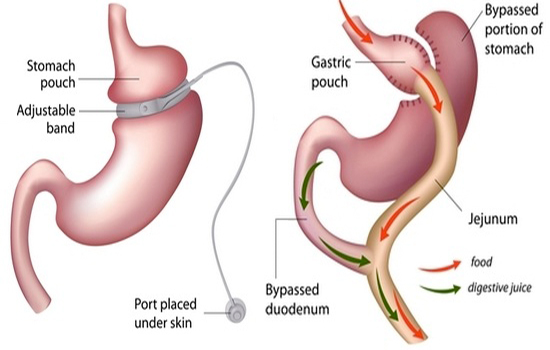Best bariatric revision surgery in delhi
What Is Bariatric Revision Surgery?
Bariatric revision surgery is a treatment used to repair or improve previous weight reduction surgery. Bariatric surgery is usually successful—people lose weight and sustain a new, healthier lifestyle. However, for a number of reasons, some patients discover that the procedure deteriorates with time or is no longer effective. Revision surgery may be beneficial. Dr. Saggu is the best bariatric surgeon in Delhi.

Who Is a Candidate for Bariatric Revision Surgery?
If you’ve undergone weight reduction surgery in the past but are still falling short of your objectives, or if you’re having issues, we can assist. We provide revision weight reduction surgery for the following conditions:
- Weight increase after surgery
- Gastroesophageal Reflux Disease (GERD)
- Gastric pouch enlargement
- swallowing difficulties
- Ruptured or displaced gastric bands
- Displaced gastric band ports
- Disrupted staples
What are the Tests for Bariatric Revision surgery?
Doctors also do diagnostic testing to ensure that your revision surgery is the finest and safest option for your requirements. Among the possible tests are:
- Endoscopy
- Manometry
A minimally invasive treatment that evaluates your esophagus, stomach, and the first section of your small intestine using a thin, flexible scope inserted via your mouth.
To examine your digestive system, a specific dye combined with X-rays is used.An examination of the esophagus to see how effectively it moves and empties.
Procedure for Bariatric Revision surgery
Under general anesthesia, revision weight reduction surgery in Delhi will be performed by a bariatric surgeon. Revision surgery, like the initial treatment, may be either classic open surgery or less invasive laparoscopic surgery. In many circumstances, the revision may be performed laparoscopically. As a consequence, there are fewer short-term hazards following surgery, less discomfort, and a faster recovery. If you have substantial scars from the previous surgery, your doctor may recommend an open procedure with a wide incision.
What are the types of Bariatric Revision surgery?
Gastric band revision
Sleeve gastrectomy and gastric bypass surgery in Delhi are two options for gastric band revision. A considerable section of the stomach is removed to form a tubular pouch in a sleeve gastrectomy. This significantly lowers the size of the stomach. Gastric bypass surgery involves removing a small pouch from the stomach. The surgeon separates the small intestine and joins this small pouch to the lower section of the small intestine before connecting the top part of the small intestine to the lower part further down. This permits bile from the liver and pancreatic enzymes to mix with food for digestion.
Gastric sleeve revision
Gastric bypass, re-sleeving, and duodenal switch surgery are all examples of gastric sleeve alterations. Re-sleeving is a treatment that involves repeating the sleeve procedure in order to lower the stomach size and restore the tubular pouch. Duodenal switch surgery combines sleeve gastrectomy with gastric bypass. It bypasses more of the small intestine and achieves more weight reduction than other types of bariatric surgery. However, it also carries a higher risk of malnutrition and other problems.
Gastric bypass revision
Gastric banding, sleeving the bypass, and bypassing more of the small intestine are among the improvements to the gastric bypass. Gastric banding involves the placement of an adjustable silicone band around the upper portion of the stomach. The bypass is sleeved by removing a portion of the bypass pouch. By going through more of the small intestine, the pouch connection is moved further down the small intestine. This restricts the amount of calories you can absorb.
How long will it take to recover?
You will be hospitalized for a few days, just as you were after your first bariatric surgery. In general, revision procedures result in a somewhat longer stay than the first surgery. Recovery time may also be extended.
Your recovery period will be determined by your age, general health, and the kind of revision surgery you had. Physical therapy may aid in your rehabilitation by building strength and stamina while also reducing discomfort.
Dr. Sukhvinder Singh Saggu is the best bariatric surgeon in Delhi for appointments call now 9871056324
Frequently Asked Questions
- Is revision surgery risky?
Ans. There are increased risks involved with revision surgery compared to the original surgery. These risks include anesthetic reactions, bleeding, blood clots, and infection. Some patients experience extensive scarring from the previous procedure, and the risks may be even higher.
- How much weight will I lose with revision surgery?
Ans. Typically, patients undergoing revision to gastric bypass experience a weight loss of 10-15% less than their original procedure, resulting in about 60-65% loss of excess body weight. However, only some lose the same weight after the revision surgery.
- How successful is revision bariatric surgery?
Ans. Usually, the outcome of bariatric revision surgery is positive, and patients are relieved from heartburn and other symptoms. Nevertheless, revision surgery is generally more complex and risky than the initial operation.
- How long is revision surgery recovery?
Ans. Full recovery may take up to 12 months. However, most individuals can comfortably return to work and resume some of their regular activities within three to six months after undergoing surgery.
- Can I get a revision bariatric surgery a year later?
Ans. In some cases, a second procedure is needed to achieve better results. It is common for revisional procedures to be performed anywhere from a few years to as long as 20 years after a person’s initial surgery.
